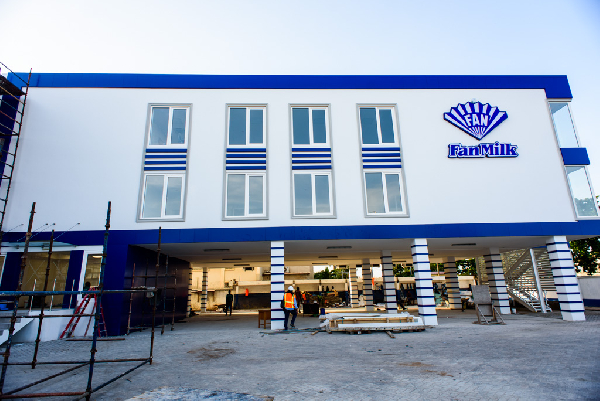Fanmilk, Adonko ,Trust Link, several companies cited in tax evasion, money laundering scandal

Documents obtained by GhanaWeb indicate that over 1,300 companies were cited by the Ghana Revenue Authority (GRA) for perpetrating fraud using the Import Declaration Forms (IDF) regime between 2021 and 2024.
To ensure accurate tax calculations, compliance with import regulations, and facilitate the clearance of goods through customs, the Ministry of Trade and Industry issues IDFs to importers.
As a regulatory requirement for customs reconciliation, the document, among other things, indicates the type, quantity, and cost of goods and aids commercial banks in transferring funds on behalf of importers for the purchase of their goods.
However, available details indicate that this regime has become an avenue for tax evasion, under-invoicing, and money laundering by some importers.
As detailed in GRA documents obtained by this portal, the Authority audited 548 companies between 2021 and 2024, with a cumulative total of GH¢355,858,268.71 in collections and GH¢656,206,006.21 in penalties, bringing their total assessed liability to GH¢1,012,064,266.91.
The documents further revealed that the GRA referred 537 importers to the Economic and Organised Crime Office (EOCO) for further investigation into potential tax evasion and money laundering between 2021 and 2023.
However, according to the GRA, 222 importers were deemed not worth auditing because their financial transfers were below the USD 100,000 threshold.
Meanwhile, a list of the companies involved, obtained by GhanaWeb, indicates that several firms, primarily in the private sector, were implicated in this scandal.
Some of the companies include frozen dairy products manufacturer Fan Milk Ghana, Three Hills Ghana Limited, Trust Link Ventures Limited, bus sales and servicing firm Yutong Ghana Limited, top agro-business and manufacturing firm Wilmar Africa, Adonko Bitters Limited and Franko Trading Enterprise
Others are Kantanka Automobile Company Limited, Trassaco Estates Development Company Limited, alcoholic and non-alcoholic beverage manufacturer Kasapreko Company Limited and construction firm Kofi Job Company Limited.
While the GRA documents do not specifically state the infractions each listed company may have engaged in, an April 2021 release by the Authority noted that, upon noticing the misuse of IDFs by importing companies, the GRA formed a multi-agency team comprising the Ministry of Trade and Industry, the GRA, the Financial Intelligence Centre (FIC), and the Economic and Organised Crime Office (EOCO) in the first quarter of 2020 to investigate the issue.
According to the GRA, an initial analysis of 2019 data from commercial banks against customs data uncovered approximately 10,000 unreconciled documents from over 2,000 companies, with funds transferred amounting to approximately $1.8 billion.
The report noted that further questioning of importers resulted in startling revelations, including the use of IDFs by some importers to clear goods different from the specific goods for which foreign exchange was obtained.
The report also revealed that companies imported goods valued less than those stated on their IDFs (under-invoicing).
The companies were also cited for single transfers of funds for multiple imports and multiple recipients, as well as transfers made on behalf of importers by forex/informal sector operators.
The GRA also noted that the probe revealed alarming incidents of bank staff engaging in the transfer of funds for clients who were not importers.
Meanwhile, GhanaWeb sources indicate that a post clearance audit by the Ghana Revenue Authority has found some of the companies guilty and imposed penalties on them.
Legal Consequences for Money Laundering, Under-Declaration, and Other IDF-Related Offences
In Ghana, importers involved in under-invoicing, under-declaration, and money laundering through Import Declaration Forms (IDFs) are subject to sanctions under several legal frameworks, primarily the Customs Act, 2015 (Act 891) and the Anti-Money Laundering Act, 2020 (Act 1044).
These laws are enforced by the Ghana Revenue Authority (GRA) Customs Division, the Financial Intelligence Centre (FIC), and the Economic and Organised Crime Office (EOCO). IDFs, issued by the Ministry of Trade and Industry (MOTI), are critical for import approvals and fund transfers, and their misuse is closely monitored.
Under-invoicing, where importers declare a lower value for goods, and under-declaration, involving misrepresentation of goods’ quantity or type, are addressed under the Customs Act, 2015 (Act 891). Section 87 stipulates that submitting false declarations or undervalued documents, such as IDFs, to evade duties incurs a penalty of up to three times the evaded duty or a fine not exceeding GHS 10,000, or both.
For specific goods like paper products, the GRA may impose a penalty of 300% of the evaded duty, with banned goods subject to seizure. Section 84 permits seizure and forfeiture of goods involved in such offences. Section 88 allows for criminal prosecution for deliberate false declarations, with penalties including imprisonment for up to three years, a fine, or both.
Money laundering through IDFs, such as using inflated import values to transfer funds abroad, is governed by the Anti-Money Laundering Act, 2020 (Act 1044). Section 3 defines money laundering as converting or concealing proceeds of unlawful activities. Convicted individuals face fines of 100% to 500% of the proceeds, imprisonment for at least seven years, or both, while corporate entities face fines of at least 300% of the proceeds.
Section 23A allows the FIC to freeze accounts or assets linked to suspected money laundering for up to one year. Section 45 permits confiscation of illicit proceeds. Section 30 mandates accountable institutions, such as banks and clearing agents, to report suspicious IDF-related transactions within 24 hours, with non-compliance resulting in fines.
Guilty importers may be banned from obtaining future IDFs or face import restrictions. Banks processing IDF transactions are also mandated to verify import legitimacy, with sanctions under the Banks and Specialised Deposit-Taking Institutions Act, 2016 (Act 930) for non-compliance.
Relevant legal provisions include Sections 84–88 of the Customs Act, 2015 (Act 891) for false declarations and penalties, and Sections 3, 23A, 30, and 45 of the Anti-Money Laundering Act, 2020 (Act 1044) for money laundering offences, asset freezing, reporting, and confiscation. The Value Added Tax Act, 2013 (Act 870), Sections 35–37, addresses VAT compliance on imports, with penalties for evasion.
GRA Details Measures to Combat IDF Infractions
In a response dated February 28, 2025, to a Right to Information (RTI) request by the Convenor of the Movement for Truth and Accountability, Joseph Bediako, the GRA listed measures it has implemented to address infractions by importers.
The GRA noted that its Post Clearance Audit Department (PCA) has integrated IDF audits into its general audit programme. The Authority also asked the Ministry of Trade and Industry, along with other stakeholders, to ensure that the same IDs used for transferring funds to foreign suppliers are utilized for clearing associated imports.
The GRA also required banks to verify that funds transferred to foreign suppliers are accounted for by submitting corresponding customs clearance documents. Additionally, the Authority noted that Seagull Limited has been contracted to develop a system to consolidate data from all institutions involved in the “IDF 2 Project” to curb abuses of IDF usage by importers.
Penalties and Sanctions Against Culpable Companies
In the response to the RTI, the GRA outlined penalties and sanctions imposed on culpable companies in line with legal provisions.
“Importers who fail to declare acceptable customs values or declare lower customs values for the purposes of valuation and duty assessment commit an offence pursuant to Sections 121(2)(o) and 123(1)(f) of the Customs Act, 2015 (Act 891). A pecuniary penalty of 300% of the amount of short collection is imposed and recovered from defaulting importers in accordance with Sections 121(3) and 123(2)(a) of the Customs Act, 2015 (Act 891).
“Some affected importers took advantage of the Penalty and Interest Waiver Act, 2021 (Act 1065) and the Penalty and Interest Waiver Act, 2022 (Act 1081), and had their penalties waived during the period. Penalties that fell outside these periods were recovered in line with Sections 121(3) and 123(2)(a) of the Customs Act, 2015 (Act 891),” the response stated.
MFTA Raises Alarm Over Missing Companies, Discrepancies in GRA Response
Meanwhile, Joseph Bediako and the Movement for Truth and Accountability (MFTA) have raised concerns over what they say is the omission of some companies from the GRA’s list of companies cited for infractions.
According to the group, while the GRA’s April 8, 2021, press release cited over 2,000 companies for infractions involving fund transfers amounting to approximately $1.8 billion, the Authority’s response to MFTA’s 2025 RTI request, demanding details and actions taken to recover revenues lost by the state, provided details for only 1,307 companies, failing to account for approximately 693 companies.
This, according to MFTA, raises concerns about transparency and accountability in the operations of the GRA in relation to the 693 unaccounted companies.
Investigative Agencies’ Corroboration
Meanwhile, further documents obtained by GhanaWeb indicate that the Financial Intelligence Centre, as far back as December 2020, acknowledged its investigation into IDF infractions, including under-invoicing, under-declaration, and money laundering.
“… kindly note that subjects already exist in our database and the matter is receiving the necessary attention,” a response by the FIC to a demand by MFTA for an investigation into alleged issues of money laundering by importers stated.
Similarly, the GRA document referencing the referral of 537 companies to EOCO for investigation indicates that the investigative body is also aware of the issues at hand.





